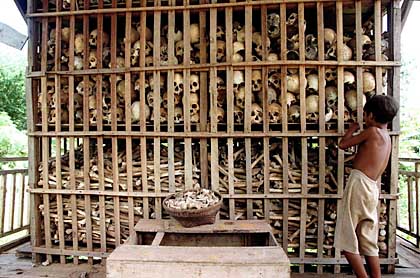
came to a close today in Phnom Penh, Cambodia. Extraodinary Chambers in the Courts of Cambodia, a UN-backed tribunal, sentenced Kaing Guek Eav, commonly known as Duch, to 19 years in prison for crimes against humanity and war crimes for overseeing the torture and killing of more than 14,000 prisoners at the S-21 prison between 1975 and 1979. During the trial, Duch’s testimonies wavered from admissions of guilt to claims that he was a small part of a greater mechanism. From a New York Times report:
“I am accountable to the entire Cambodian population for the souls that perished,” [Duch] said at one point. “I am deeply remorseful and regret such a mind-boggling scale of death.” But he added: “I ended up serving a criminal organization. I could not withdraw from it. I was like a cog in a machine. I regret and humbly apologize to the dead souls.”
Duch is the first member of the Khmer Rouge to be found guilty of committing war crimes. It is estimated that 1.7 million Cambodians died of starvation, disease, torture, and execution during the Khmer Rouge’s regime. Along with the devastating death toll, the Khmer Rouge’s reign had a profound impact on the future of Buddhism in Cambodia. In “Silence in the Pagoda,” printed in the Fall 2009 issue of Tricycle, Rollo Romig explores the affects of the Khmer Rouge regime on Buddhism and the reemergence of Buddhist monkhood after years of political persecution and oppression. From Romig’s article:
According to Cambodia’s Ministry of Cults and Religions, as of December 2008 there were 55,583 monks in Cambodia—nearly the same number as had been reported just before the Khmer Rouge era. But the character of the monkhood has changed. Prior to the 1970s, temporary ordination was nearly universal for young Cambodian men. Monkhood was a rite of passage to adulthood and a way to honor one’s parents and grandparents. Today the reasons for ordaining are more varied, and few men take vows for life. Many put on robes for their university years and defrock after graduation. Others enter the pagoda to escape debt, drug addiction, poverty, or military conscription….When I asked Cambodian monks to tell me the biggest problem facing the sangha today, they used the same words over and again: We have quantity, but not quality. Of all the things Cambodia lost in the Khmer Rouge era, they said, the most damaging to Buddhism was the loss of a whole generation of learned and elder monks.
Last night, survivors and relatives of prisoners killed in the prison Duch oversaw gathered at the S-21 prison grounds for a special Buddhist ceremony held in remembrance. A short video of the ceremony can be seen here at euronews.com.